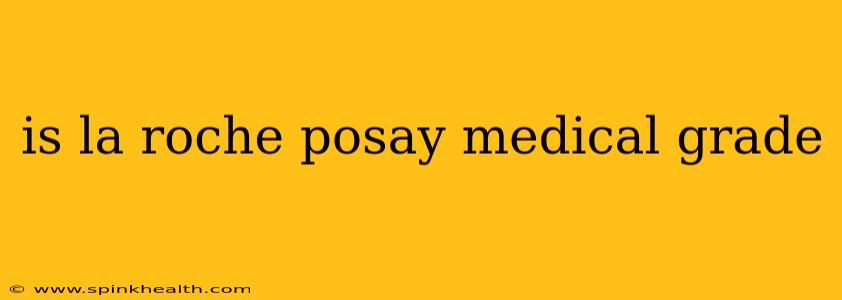Is La Roche-Posay Medical Grade? Navigating the Skincare Claims
The question of whether La Roche-Posay is "medical grade" is a common one, and the answer isn't a simple yes or no. It's a nuanced discussion that hinges on understanding what "medical grade" actually means in the context of skincare. Let's unravel this mystery together.
My journey into the world of skincare started with a frustrating search for solutions to my sensitive, acne-prone skin. I tried countless products, from drugstore finds to high-end department store brands, often feeling overwhelmed by conflicting claims and marketing jargon. La Roche-Posay was one brand that repeatedly popped up in my research, promising gentle yet effective solutions. But the "medical grade" label always lingered in the back of my mind.
What Does "Medical Grade" Skincare Actually Mean?
This term, often used in marketing, lacks a universally accepted definition. There's no official regulatory body that stamps products with the "medical grade" label. Generally, it's used to suggest a product:
- Is sold through a dermatologist or other healthcare professional: This implies a higher level of scrutiny and potential efficacy. However, many brands sold in dermatologists' offices aren't necessarily inherently superior to those found in drugstores or online.
- Contains higher concentrations of active ingredients: This is partially true. Some "medical grade" brands may use higher concentrations of ingredients like retinol or acids. But again, this isn't a guaranteed characteristic.
- Undergoes rigorous testing and clinical trials: While some brands do extensive testing, this isn't a requirement for the "medical grade" label.
The truth is, the term is often a marketing strategy to justify a higher price point.
Is La Roche-Posay Sold by Dermatologists?
Yes, La Roche-Posay is frequently recommended and sold by dermatologists. This lends credibility to the brand and suggests it meets certain standards of efficacy and safety. However, this doesn't automatically make it "medical grade" in the strictest sense of the term.
Does La Roche-Posay Use High Concentrations of Active Ingredients?
La Roche-Posay utilizes active ingredients like retinol, salicylic acid, and niacinamide in many of its products. However, the concentrations may not always be as high as those found in some products marketed specifically as "medical grade." Their formulations are designed for broad use, prioritizing gentleness and tolerability even for sensitive skin.
What Kind of Testing Does La Roche-Posay Undergo?
La Roche-Posay is a well-established brand with a history of rigorous testing and clinical trials supporting the efficacy and safety of its products. Their commitment to dermatological research is a key factor in their reputation.
So, Is La Roche-Posay Medical Grade? The Verdict
While La Roche-Posay isn't explicitly labeled "medical grade" by any official body, its dermatologist recommendation, rigorous testing, and use of effective active ingredients make it a reputable and reliable skincare brand. It occupies a space somewhere between drugstore and strictly "medical grade" lines, offering a balance of efficacy and gentle formulation for a broad audience. Whether or not it's "medical grade" is less important than its proven efficacy and suitability for your specific skin concerns. The best way to determine if it's right for you is to consider your skin type and needs, and perhaps consult with a dermatologist for personalized recommendations.
My own experience with La Roche-Posay has been incredibly positive. I found their products gentle enough for my sensitive skin yet effective in managing my acne. However, what works for me might not work for you, highlighting the importance of individual skin assessments.

